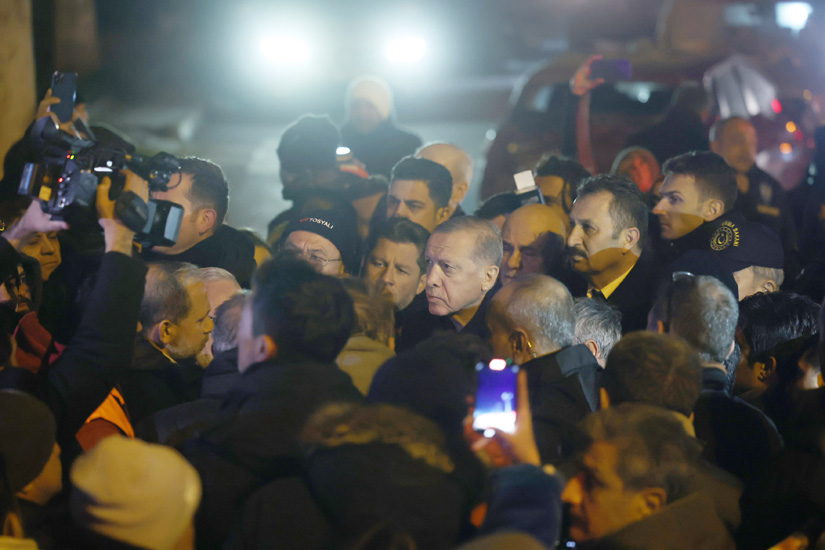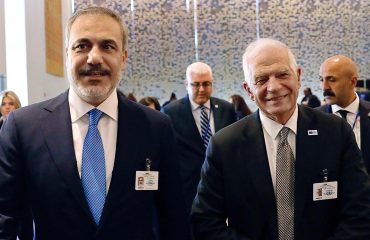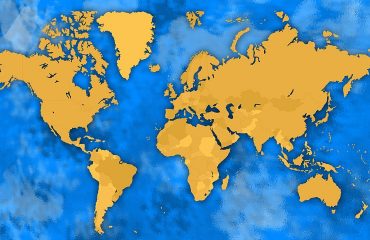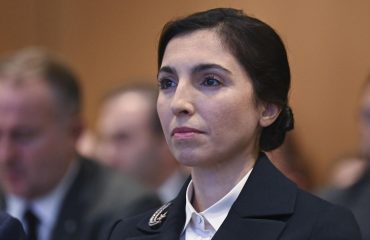

The recent Turkish quake claimed 48,448 lives so far, further affecting the economy and is likely to have an impact on the election results. President Erdoğan as being briefed about the loss on site in Hatay on February 8. (Photo: Presidency)
The chain of disasters that started in the 2020s never leaves Turkey. First, the pandemic process experienced around the world greatly affected the economic and social life in the country in 2020 and 2021. Then, in 2022, the impacts of the Russian aggression and occupation of Ukraine were felt by the entire international community of nations to various degrees. Türkiye suffered greatly from the backlash of the war. More so, the unfortunate wrong economic decisions the Turkish government took contributed greatly to landing the country in an immense economic crisis.
Just when Turks were hoping for some betterment in the situation due to the approaching presidential and parliamentary elections in early summer, on February 6th, 2023, two devastating earthquakes struck the eastern region of Türkiye, causing at least 48,448 lives (as of March 13), widespread damage and loss of life. The quakes, which measured 7.7 and 7.6 on the Richter scale, struck at a depth of seven kilometers and were felt across eleven provinces, including worst-hit Hatay, Adıyaman, Kahramanmaraş, and Malatya.
Although it might be early to estimate a figure, estimates are being made on the financial cost of the earthquake. In addition to those who estimate the cost to be at around $30 billion, there are those who estimate it at $84 billion or $100 billion or even more, as expelled. Bu UN experts. European Union to convene Turkey donors conference on March 20.
Painful cost ahead
One month on since the Feb. 6 quakes, experts claim contrary to the government’s pledges to complete reconstruction in the entire quake region and place all the victims in new homes within the next 12 months, experts underline that the target to remove all debris within three months and complete all reconstruction work in one year is both aloof targets impossible to be achieved. According to opposition claims tens of thousands of people might have been still buried under the debris. People complain of clean drinking water shortage in the quake-hit region, particularly in Hatay. In many localities in the quake region, people complain of a shortage of tents. The Turkish economy, already facing acute financial challenges now faces the task of rebuilding a massive quake-ridden geography.
According to estimates by UN experts Türkiye might need as much as 100 dollars for the reconstruction efforts.
Individual countries extended some generous help to Türkiye to overcome the grandiose task it faced. Yet, reconstruction might require 30 to 100 or perhaps more billion dollars, a figure that Türkiye alone cannot provide. Although a special quake tax the Turkish government has been collecting since the 1999 quake, according to opposition figures, must have exceeded 48 billion dollars by now as that money was used to finance some other budgetary expenses, there is not one single penny in the quake fund. The Central Bank’s emergency fund, also, was used to the last penny by the government to finance the latest exchange crisis, thus it is of no avail either.
Despite woes, EU pledges help
Turkey has been going through a serious crisis with the European Union over differences regarding freedom of expression, disinformation law, Kurdish rights and Turkey’s foreign policy objectives, particularly its policies regarding Syria and Syrian refugees.
Apart from a 12 million euro immediate emergency aid, the European Commission and the Swedish Presidency of the Council of the EU have decided to host on March 20 an International Donors’ Conference to support the people in Türkiye, and Syria. The Donors’ Conference will be open to EU Member States, candidate countries and potential candidates, neighboring and partner countries, G20 members – except for Russia – the Member States of the Gulf Cooperation, as well as the UN, international organizations, humanitarian actors and international and European financial institutions.
Some combing their hair
While the neighborhood is battling with the fire, the spoiled ugly girl is busy combing her hair, goes a Turkish saying stressing how some people might upset others with rather unwelcome attitudes.
While the country is trying to battle to overcome the devastating impacts of twin deadly quakes that hit the country a month earlier, Turkish President Recep Tayyip Erdoğan decided on March 10 for the “renewal” of presidential and parliamentary elections.
“Renewal of elections” was an attempt to cover up the situation with terminology not described in the laws of the country. If the scheduled June 18 elections are to be held on May 19, that would be an early election. Under the Turkish Constitution if the country goes to early elections and the election decision is not made by parliament but by the president in office, the president cannot seek reelection for a third term. Erdoğan is in this second term. Cannot run for a third term as he called for an early election. Thus, with a “renewal of election” wording he wanted to overcome the constitutional constraint on his candidacy. Yet, throughout the campaign period, the opposition will stress the illegitimacy of his candidate status.
Leveled cities
The earthquake caused significant damage to buildings and infrastructure, particularly in the Hatay, Adıyaman, Kahramanmaraş, and Malatya cities, where several multi-story buildings collapsed, trapping dozens of people underneath the rubble. Rescue workers and volunteers worked tirelessly in the aftermath of the quake, using heavy machinery and their bare hands to search for survivors and recover the bodies of those who perished in the disaster.
As the days passed, the scale of the tragedy became increasingly clear. According to official figures, more than 46,000 people lost their lives, with much more injured and millions of people left homeless. One month on the government is still unable to give a clear death toll as many people remain buried in the debris and there are thousands of missing people. Repeated pleas and question motions filed in parliament demanding the government disclose how many people lost their lives in the quakes were all left unanswered.
According to unofficial figures, some 2.5 million people left the quake-ridden cities and villages to settle in central and western Turkey. The economic impact of the disaster was also significant, with estimates suggesting that the cost of rebuilding damaged infrastructure could run into several tens of billions of dollars.
Disaster management problems
In Hatay, Adıyaman, and Kahramanmaraş cities all printing works, newspaper offices, and local media establishments were devastated while the damage to the media sector in Malatya is comparatively less, and in the other seven affected cities, the damage is minimal. The situation is almost identical for all fields of the economy.
In response to the disaster, the Turkish government and international aid agencies launched a poorly coordinated relief effort and tried to provide emergency supplies such as food, water, and medical equipment to those affected by the earthquake. However, even President Recep Tayyip Erdoğan admitted that in the most important first three days, his government badly failed in relief and rescue efforts. The Turkish Red Crescent was not visible in the quake region in the first week and the Turkish Diasaster and Emergency Management Directorate (AFAD) tried to monopolize entire relief and rescue operations and badly failed in the first week. Gradually coordination was established and Turkish and other organizations set up temporary shelters and field hospitals to provide basic care for those in need, while rescue workers continued to search for survivors amidst the rubble. Yet, the precious first three days were wasted in AFAD’s greedy efforts to capitulate on all rescue and relief efforts with its meager 7,500 personnel.
What was the reason for failure?
• Lack of preparedness: Despite Turkey being in a seismically active region and experiencing several devastating earthquakes in the past, the government had failed to adequately prepare for the possibility of another major earthquake. Though Türkiye introduced a special quake preparedness program and introduced a special tax back in the aftermath of the 1999 quake, some 38 billion dollars collected as quake tax was spent on some other budgetary expenses. The gross negligence and impotence in taking quake preparedness measures increased worries of the Turkish people on what might be the situation if the long feared İstanbul quake hit the country anytime soon.
• Poor coordination: The government’s communication and coordination during the disaster response was poor, which led to confusion and disorganization. AFAD, the state agency created to coordinate disaster relief efforts, was proved to be underequipped. More so, the “Turkish type” presidential system rendered all local and central government officials without power or capability to undertake risks as under the new system the president was the only and sole executive power holder. There were reports of conflicting information being provided by different government agencies, and a lack of clear direction on what actions should be taken.
• Delayed response: The government’s initial response to the earthquake was delayed, with a noticeable absence of the military, emergency services, and equipment, such as ambulances and heavy machinery, which are crucial in search and rescue operations. According to many analysts, the military was not allowed to engage in the search, rescue, and relief efforts in the first crucial important period of the quake. That was said to be because of the phobia of the ruling party that if allowed to take to the streets the military might overthrow the government.
This lack of government assistance delayed the search and rescue efforts, putting the lives of survivors at risk and increasing the likelihood of fatalities.
• Insufficient resources: There were insufficient resources and personnel available to deal with the scale of the disaster, which resulted in further delays and difficulties in the search and rescue efforts. As stressed earlier, the AFAD had only around 7,500 personnel. With the creation of AFAD Red Crescent was not allowed to intervene in rescue efforts, using its volunteers. Thus, there was an acute underestimation and lack of organization.
• Inadequate support: The government’s failure to provide adequate support and assistance to the survivors of the earthquake was also a major issue. Many survivors were left without shelter, food, and water for several days after the earthquake, and there were reports of looting and violence in some areas. The government’s slow response in providing relief supplies and assistance to the affected communities only added to the suffering of those who had lost their homes and loved ones.
• Corruption: There were also reports of corruption and mismanagement of relief funds, with some aid packages reportedly being diverted or stolen by local personnel. It was awkward to learn that while people were screaming for tens and canned food, the Turkish Red Crescent was apparently selling such items to private relief groups, and associations. The head of the Turkish Red Crescent remains in office despite the scandals becoming public.
• Lack of accountability: The government’s failure to take responsibility for the shortcomings in its disaster response and to hold those responsible accountable for their actions or inaction further eroded public trust in the government’s ability to handle future disasters.
Overall, the failure of the Turkish government in search and rescue efforts in the twin quakes can be attributed to a combination of factors, including lack of preparedness, poor coordination, delayed response, insufficient resources, inadequate support, corruption, and lack of accountability. These failures underscore the urgent need for improvements in disaster preparedness and response in Turkey, in order to minimize the impact of future disasters and protect the lives and well-being of its citizens.
Impact on polls
• Public perception: The Turkish government’s failure in rescue efforts in the twin quakes is likely to have a negative impact on the public perception of the ruling party, AKP, and President Recep Tayyip Erdoğan seeking to reelect. The failure to respond adequately to the disaster could lead to a loss of trust in the government’s ability to protect its citizens.
• Political repercussions: The upcoming May 14 presidential and parliamentary elections in Turkey are likely to be impacted by the government’s failure in rescue efforts. On May 14, opposition parties may use this disaster as a political weapon to attack the AKP’s record on disaster management and preparedness.
• Mobilization of voters: The disaster could also mobilize voters who are critical of the AKP government and increase turnout in the upcoming elections. This could lead to greater support for opposition parties or independent candidates who are seen as more competent in disaster management.
• Damage to AKP’s campaign: The AKP’s campaign for the May 14 elections may also be damaged by the government’s failure in rescue efforts. The party may be forced to shift its focus from campaigning to disaster management and relief efforts, which could divert resources and attention away from its election campaign.
• Shift in voter priorities: The disaster may also lead to a shift in voter priorities, with issues related to disaster management and preparedness taking on greater importance for voters in the upcoming elections.
• International perception: The international perception of Turkey’s response to the twin quakes could also impact the country’s standing on the global stage. If the government is seen as having failed in its response to the disaster, this could damage Turkey’s reputation and stand in the international community.
There might be a heavy price
Overall, the failure of the Turkish government in rescue efforts in the twin quakes is likely to have significant political and electoral implications. It could damage the ruling AKP’s campaign for the May 14 elections, shift voter priorities, and impact Turkey’s standing on the global stage. It remains to be seen how the disaster will ultimately impact the election results, but the government’s response will be a key issue for voters in the upcoming elections.


